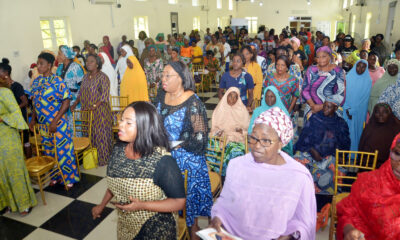DBN to Disburse N100bn to MSMEs
Development Bank of Nigeria (DBN) has revealed that it planned to disburse the sum of N100 billion to the Micro Small and Medium Enterprises (MSME) segment this year.
It also added that it disbursed over N30 billion to over 35,000 end-borrowers in the MSME segment in its first full year of operations, while also collaborating with other development finance institutions to remove some of the barriers to access to finance in the segment.
The Chief Economist for the bank, Prof. Joseph Nnanna, disclosed this yesterday at the 5th edition of the Refined Economic Development (RED) quarterly lecture held at the University of Abuja and organised by Economic and Business Strategies (EBS) with the theme, “Real Sector Constraints to Economic Growth and Development.”
Presenting his paper titled “Contemporary Strategies for Financial Inclusion and Prosperity in Nigeria,” he explained that MSME are the backbone of any economy, considering the fact that the segment makes up over 90 per cent of all firms and accounts for an average of 60 to 70 per cent of total employment and roughly 50 per cent of Gross Domestic Product (GDP) of Nigeria.
Nnanna explained that a 2018 survey by the International Finance Corporation (IFC) showed that only 31 per cent of MSME in Nigeria have ever obtained a loan from a financial institution, commercial or micro finance bank.
He said that the principal reason for the low figure in spite of its undisputable impact on the economy include, high/lack of collateral, problems with credit history, unfavorable worthiness of the prospective borrowers.
Nnanna stated: “For Nigeria as a whole, we are trying to achieve more access to finance for the MSME because we believe they are the engine that grows any economy in any part of the world.
“This year alone, the DBN plans to disburse N100 billion to MSME and we are quite on track as it is already. We are very confident that we will achieve that this year and beyond.
“Furthermore, to aid in reducing the risk associated with the MSME segment, the DBN offers partial risk sharing (Credit Guarantees) with prospective financial institutions granting credit to the operators in the segment.
“In 2018, 22.74 per cent of total credit was allocated to the oil and gas sector and 13.75 per cent was allocated to the manufacturing sector. Conversely, sectors where the MSME participants operate include Agriculture which total credit allocated was a paltry 3.16 per cent, General/Trade and Commerce 6.89 per cent and Education which credit to this sector remains subdued, received 0.41 per cent (NBS, 2018). “
The chief economist however said that the limited access to finance for the MSME segment severely constrained opportunities for economic diversification in Nigeria, noting that from a macro-economic examination, there is “a crowding out effect,” due to government borrowing.
He added, “As a result, over a period of one year, we witnessed an increase in treasury bill rates peaking at 18 per cent in 2017. At the same time banks facing a challenging external environment worked to reduce risks, crowding out liquidity to real sector including MSMEs.
“Presently, treasury bill rates have declined to 12.7 per cent. However, yields on government bonds are around 14.5 per cent making it still very attractive to lend to the government. Typically, Nigerian banks observe a value chain business model that deals with already established firms with a track record of success.
“Consequently, banks tend to ignore MSMEs because of poor or no credit history, insufficient collateral to name a few reasons. To that effect, Nigerian banks resort back to what they understand to be a sale investment choice which is competing for larger firms and accepting lower margins only to exploit the higher yields earned from credit and perhaps other fees earned through product offerings as part of the loan agreements.”
Nnanna stressed that an emerging facet in the Nigerian operating environment was the untapped fintech segment which he said could change the fortunes of the challenges surrounding access to finance.
Earlier, the Chairman/ CEO of EBS, Prof. Magnus Kpakol, said that before Nigeria would compete with developed countries, there was need for an improvement in the country’s human capital in order to produce efficiently and effectively.
“You have to be able to produce goods and services and to do that, we need improvement in human capital. Our human capital development has to be much better.
“One of the big reasons why we lag behind is because of the human capital deficiency we have. If you doing have the skills, the determination and the attitude to be competitive and to raise your skill level, you will have trouble being competitive
“You see the proficiency in with which China is conquering the world in terms of business and global competitiveness. We cannot compete with them at the pace that we are going and that reflected in the misery two per cent growth rate in that we registered in GDP in the first quarter of this year.
“Our population is growing at three per cent and we are growing our GDP at two per cent, we need to be growing our GDP at this time at close to two per cent. The Chinese have been averaging 10 per cent over the last forty years.”


 Forex3 weeks ago
Forex3 weeks ago


 Naira2 weeks ago
Naira2 weeks ago
 Billionaire Watch2 weeks ago
Billionaire Watch2 weeks ago




 Naira2 weeks ago
Naira2 weeks ago




 Naira4 weeks ago
Naira4 weeks ago




 Naira2 weeks ago
Naira2 weeks ago


 Naira1 week ago
Naira1 week ago
 Banking Sector4 weeks ago
Banking Sector4 weeks ago





















